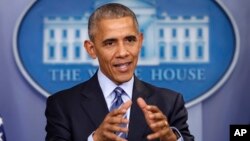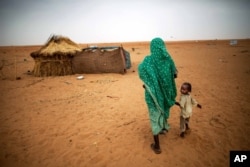U.S. President Barack Obama lifted some sanctions on Sudan today in response to what he calls "positive actions" by the country's government. They include ceasing hostilities in Darfur, improving humanitarian access, ending negative interference in South Sudan, "enhancing cooperation on counterterrorism," and ending the threat of the Lord's Resistance Army.
The move allows the U.S. Department of the Treasury to immediately authorize expanding trade and investment in Sudan. U.S. State Department spokesman Mark Toner said the executive order also provides Sudan "with a clear path to the permanent revocation of sanctions in six months if progress in these five areas continues."
Under Obama’s order, section one of President Bill Clinton’s 1997 executive order freezing Sudan's assets would be lifted in six months if Sudan's good behavior continues. It would also lift section two, which blocked all Sudanese imports into the U.S.
But one human rights observer says lifting sanctions forgives the government for decades of war and human rights violations in Sudan, and overlooks the continuing conflict in Darfur.
HRW skeptical
Leslie Lefkow, Deputy Africa Director at Human Rights Watch, said Friday she is skeptical that lifting sanctions will have any positive impact on Sudanese civilians. She says the Sudanese government has a track record of not respecting the basic human rights of its people, and the move to ease sanctions sends a message to Sudan and other repressive governments that abuses will be ignored.
"So to suggest that somehow this change of policy is going to suddenly encourage the type of human rights reforms that are so desperately needed, I think it naive at best," Lefkow said.
The sanctions were expanded in November 1997 by Clinton, who imposed a comprehensive trade embargo against Sudan and blocked assets of the Sudanese government.
The sanctions were first implemented because the Sudan government failed to end a brutal civil war with rebels in then-southern Sudan, which continued for over two decades. In addition, during the 1990s, terrorist leader Osama bin Laden lived in Sudan, under the knowledge of the Sudanese government.
The sanctions had restricted U.S. foreign aid, banned defense exports and sales, and imposed various financial restrictions on U.S. citizens doing business with Sudan.
The Obama administration says the Sudan government has made progress in ending military aerial bombardments in the Darfur region and has helped counter the terrorist Islamic State group, including limiting movements by fighters.
Little progress seen
Lefkow argues that HRW researchers have not seen objective progress in many of the key benchmarks to justify changing U.S. policy. She says humanitarian conditions in many parts of Sudan are some of the worst in the world, and conflicts in both Darfur and South Kordofan continue following attacks on civilians by government forces.
"We had a team in the Nuba Mountains just last month, where the humanitarian situation is dire. There has still been no agreement by the government to permit humanitarian agencies into the Nuba Mountains into the Blue Nile," Lefkow said, adding that "people are at incredible risk of food insecurity, they have very limited health facilities; there is virtually no education."
Lefkow says the Obama administration could have used its leverage to demand that the Sudanese government end abuses in the country.
"They should have demanded that there be concrete progress on these benchmarks prior to lifting sanctions,” Lefkow said. “This is just a gift to the Sudanese government, and I have no expectations that there will be the kind of progress that we all like to see."
The State Department seemed to agree with human rights organizations, saying in a statement released Friday that despite the advances, "there is still much more to be done to end Sudan's internal conflicts, ensure accountability for crimes of international concern, improve its human rights record, allow unfettered humanitarian access to vulnerable populations, and create space for greater political participation, civil society activity, and media freedom."
The U.S. Treasury Department says certain activities related to the Darfur sanctions may be allowed if they are licensed by OFAC, and that it has issued guidance and statements on specific licensing policies.
Sudanese President Omar al-Bashir has for years faced charges of war crimes and crimes against humanity by the International Criminal Court for alleged crimes committed against civilians in Darfur. He has yet to be arrested.






